Mexico and Central America Migration Crisis
What Is the Current Situation?
Trump administration policies are resulting in thousands of migrants and asylum seekers navigating return to their home countries or to countries in Central America, where they remain in limbo, unable to return home. Cuts to US foreign assistance have reduced critical funding for women’s organizations, health services, and gender-based violence support programs for migrants across the region, leaving migrant women at high risk for violence and exploitation.
The Women’s Refugee Commission has launched a project to assess the impact of the administration’s policies on migrant women in the region.
The Impact of US Policy Changes and Funding Cuts
As options for refugees and migrants in the region grow increasingly limited, displaced and migrant women and girls in Mexico and Central America are facing greater risks. In view of mass deportations from the United States, the closure of the US-Mexico border to asylum seekers, and other policies that are reshaping historic migration patterns, WRC has launched a research initiative, starting in Costa Rica and Honduras, to analyze the impact of these changes on women and families.
Under the Trump administration, cuts to foreign aid have reduced critical funding for women’s organizations, health services, legal assistance, and gender-based violence support programs for migrants across the region. At the same time, already strained asylum, shelter, and support systems are being further stressed by US deportations to Panama, El Salvador, and Costa Rica of nationals from outside the region, who arrive traumatized, often without information, preparation, or due process.
Women and girls face violence and exploitation at every stage of migration—whether in their home countries, where violence and insecurity often force them to flee; along the journey to the US, where they are vulnerable to trafficking and abuse; in detention in the US, where they face harsh conditions and mistreatment; or upon deportation, when they are often returned to the very dangers they sought to escape. Existing systems have failed to protect them, and new policies are only increasing the dangers they face. Those who are already the most marginalized—especially the poorest women—bear the heaviest consequences.
WRC is assessing and documenting the impact of US immigration policy changes and humanitarian funding cuts on displaced women and families in Mexico and Central America. Our research will provide a clearer picture of the harms experienced by women, girls, and other marginalized groups, and guide advocacy to mitigate these harms.
Our Advocacy and Resources
WRC is committed to ensuring the needs and rights of those impacted by the Mexico/Central America crisis are protected. Below is a list of WRC’s related advocacy work.
First Hand Look: Migrants in Honduras
Read Our New Report:
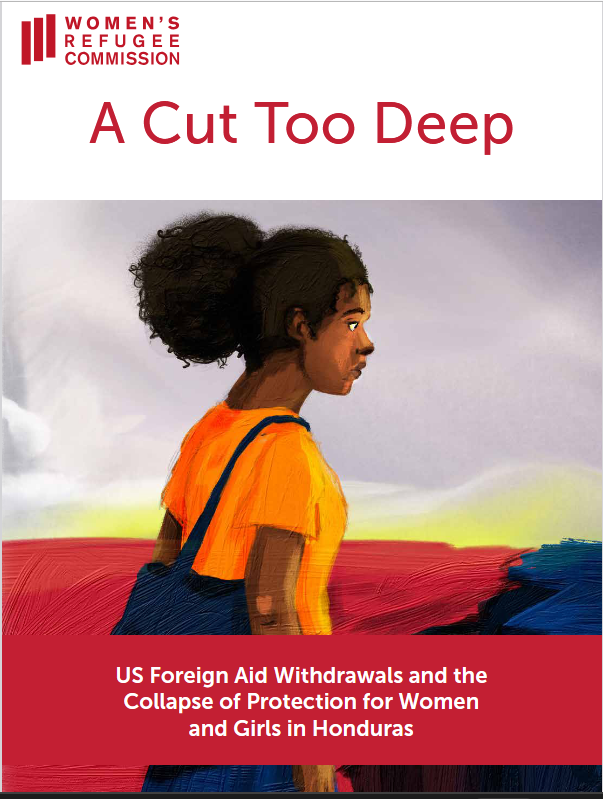
WRC partner Diana Florez introduces the project in Honduras.
Choloma, near San Pedro Sula, has some of the highest rates of femicide and violence against women in Honduras. It also receives many deported people. Before the US funding cuts, USAID supported a justice project for gender-based violence. The situation has become critical due to the cuts.
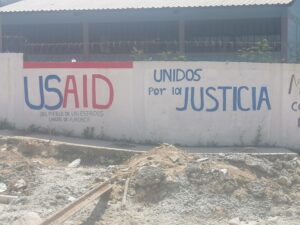
“Our US funding was cut, but violence against women hasn’t stopped,” the director of an organization in Choloma told WRC. Despite losing critical support for projects aimed at preventing gender-based violence and assisting women, including those who have been deported, organizations continue working with limited resources—“with their bare hands.” “Women will keep migrating, because here they must choose between being killed at home or fleeing. It’s not a decision—it’s the only option.”
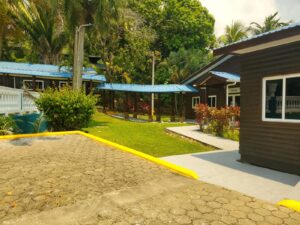
The returnee center in Omoa receives mostly men deported by land from Guatemala and Mexico (about 90%). The center offers basic support (health, psychosocial care, transport, food vouchers, and $100 cash). When people leave the center, they have to fend for themselves.
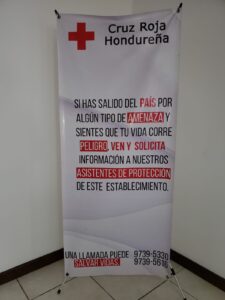
The Red Cross sign reads: If you have left the country due to any type of threat and you feel that your life is in danger, come and request information from our protection assistants at this establishment.
At the returnee center in Omoa (Honduras), gender-based violence (GBV) cases are referred to Médecins Sans Frontières (MSF), and protection concerns to ICRC or UNHCR. However, these cases are increasingly difficult to identify, partly due to women’s reluctance to report, driven by distrust and the normalization of violence, and partly due to a 50 percent reduction in staff following US funding cuts, particularly affecting psychological support.
Diana Florez reports on the Center for Returning Migrants in La Lima, San Pedro Sula, and the risks faced by deported women and girls.
First Hand Look: Migrants in Costa Rica

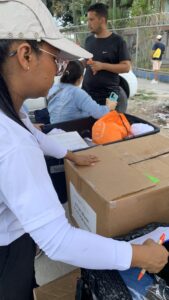
Local aid providers hand out supplies to Venezuelan migrants at the bus stop in Paso Canoas, at the Panama-Costa Rica border.
Hundreds of women and families are transiting Costa Rica as part of a “reverse migration”; most are heading to Venezuela and Colombia, but some are applying for asylum in Costa Rica. The Trump administration’s closing of the border and cancellation of CBP One appointments, along with the two planes of people from Iran, Afghanistan, and elsewhere deported from the US to Costa Rica in March, and the major cuts to foreign aid have made life very difficult for these families that are trying to find someplace safe to live.
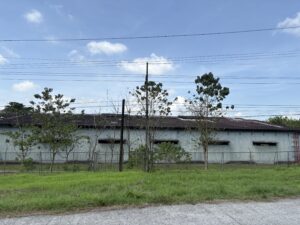
CATEM is a migrant detention and processing facility on the Costa Rica-Panama border. It has most recently been used to house migrants from Iran, Afghanistan, China, and elsewhere, including many children, who have been deported from the United States.

